Letter from Africa: Ramadan keeps Sudan protesters hungry for change
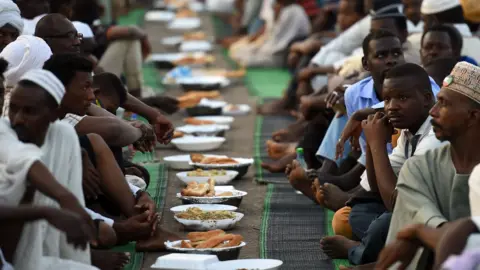 AFP
AFPIn our series of letters from African journalists, Zeinab Mohammed Salih explains how Sudan's protesters are managing to keep going during the Muslim fasting month.
More than a month since Sudan's long-time leader Omar al-Bashir was arrested by the military, crowds are still camped out - day and night - in front of the army headquarters in the capital, Khartoum.
They feel the transitional military council is procrastinating about handing over power to civilian rule - and are determined that the energy of the sit-in is not diminished during Ramadan, when Muslims do not eat or drink between dawn and sunset.
A buzz can be felt around the vigil site directly after sunset when people gather for Iftar, the meal when the fast is broken.
Moments after the prayer to break their fast, the protesters start chanting: "A civilian government or a revolution forever."
Another chant that often follows is: "I'm not going back, I have demands."
Thousands start arriving - some bring their own food and drinks from home, others cook for themselves in huge pans at the sit-in.
Meals are also provided by women who put out calls on social media for volunteers to go to their homes to collect the food.
Many companies also take bottles of water or food in big trucks, so no-one at the sit-in goes hungry or thirsty at night.
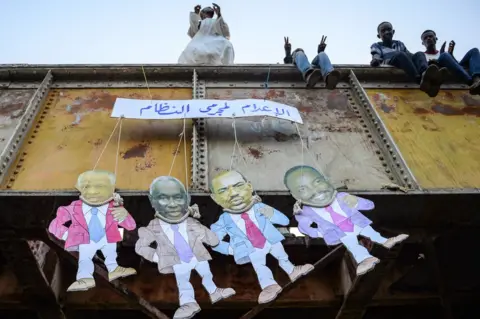 AFP
AFPThen the time for speeches begins. Activists and ordinary people, who never dreamed of talking publicly, get up to address the crowds.
They talk about the alleged atrocities committed by the army and militias close to the former regime - and how their families have been affected.
Microphone in hand, they tell of things many people have never heard about.
Many of the speakers come from war-torn areas such as Darfur or South Kordofan.
Some tell of how they have been victims of the dam building in the north and have been forced from their homes.
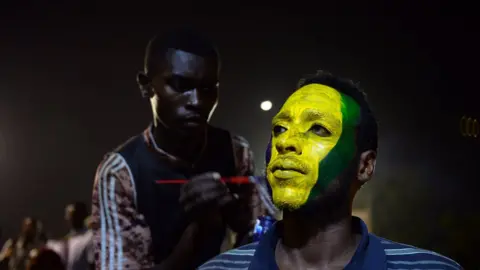 AFP
AFPFamilies of protesters killed during the demonstrations also speak.
All through the night people talk, raise awareness - wanting to make the protest count for something in the future.
Many more people now spend the night at the sit-in, whether they are sitting at the open-air cafes or sleeping on the ground or grass by the nearby railway line.
Scorching heat
Fewer demonstrators sit out the day in the stifling heat of Khartoum. Some people have donated mobile air-conditioning units to the protesters, but these can do little to ease temperatures that often peak at more than 40 degrees.
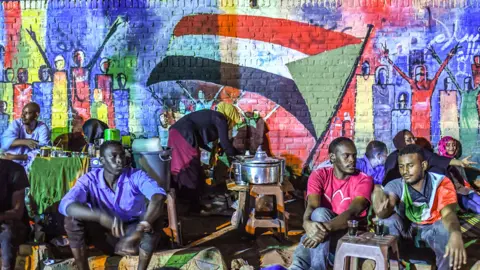 AFP
AFPBut it has not stopped the artists, who continue painting the walls around the sit-in area during the day time, with one group working on rolls of canvas to form a 3km (nearly two-mile) work of art that they want to unroll around the site.

More on the protests:

In the rest of the city, queues at the ATMs, petrol stations and in front of the bakeries are back, with long traffic jams.
It was cuts to bread and fuel subsidies that sparked the initial demonstrations in December that escalated into demands for the removal of Mr Bashir and his government.
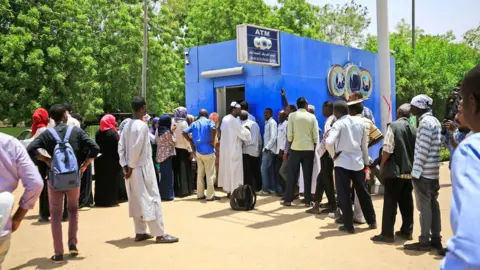 AFP
AFPSome protesters feel that remnants of the former regime are behind the queues - to ferment discontent and frustration about the sit-in.
Less harassment for women
More aggressive attempts to disperse the protesters have been reported.
Former football star Haitham Mustafa accused men in military uniforms of beating up him at the vigil and journalist Rishan Oshi said her face was slapped on the street by men in civilian clothing who then escaped by motorbike. She believes she was targeted because of her vocal activism.
But despite these difficulties, there is a sense of happiness in the city - people are more optimistic now and smiling more.
Women feel less harassed. Instead of the usual verbal abuse, men tend to call all women "Kandaka", a reference to queens in the ancient Kush kingdom that ruled Sudan thousands of years ago.
Before Mr Bashir's removal, there was some antipathy towards the use of the word by female protesters.
But it was the nickname given to Alaa Salah, the 22-year-old student who became a protest icon after a video of her leading chants against Mr Bashir went viral.
It all goes to show how quickly things are evolving in Sudan - and the protesters want to ensure that any further changes go their way.

More Letters from Africa
- The art of drawing your address
- Chibok parents turn to TV 'miracle' pastor
- 'We're not cleaners' - sexism amid Sudan protests
- Fighting 'uniform hairstyles' in Kenya
- Should MPs be sent back to school?
- Are Kenyans still scandalised by scandals?
- The country where everyone is expected to be late
- How Nigeria's elite avoid 'bad education'
Follow us on Twitter @BBCAfrica, on Facebook at BBC Africa or on Instagram at bbcafrica

